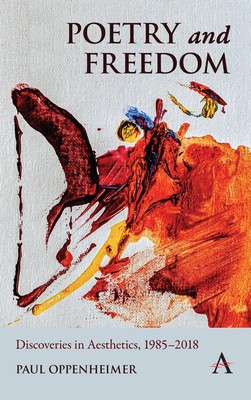
- We will send in 10–14 business days.
- Author: Paul Oppenheimer
- Publisher: Anthem Press
- ISBN-10: 1839981784
- ISBN-13: 9781839981784
- Format: 15.2 x 22.9 x 1.3 cm, minkšti viršeliai
- Language: English
- SAVE -10% with code: EXTRA
Poetry and Freedom: Discoveries in Aesthetics, 1985-2018 (e-book) (used book) | bookbook.eu
Reviews
Description
This book offers a ground-breaking exploration of the aesthetics of poetic freedom. The range is broad, from antiquity to the present and from Europe and the Middle East into the poetry of the English-speaking world. Silent reading is shown as developing for the first time since the fall of the Roman Empire into a fashionable way of reading, starting with the invention of the sonnet in the High Middle Ages. The social use of the word "we," as when a society generalizes about itself, first appears in poetry in T.S. Eliot's "The Love Song of J. Alfred Prufrock." In Goethe's "Roman Elegies" anachronism becomes a literary device--also, it seems, for the first time--introducing a novel timelessness essential to modern affirmations of infinity.
Revealing questions about the elusiveness of poetic freedom--what does the term actually mean?--are repeatedly tested against the accomplishments of major poets such as Whitman, Dickinson, Rilke, Dante and Virgil, and their public yet intensely private originality. The result is a fresh, and well-nigh revolutionary, way of seeing literary and modern history, or an initiation into the more striking gift of aesthetic freedom.
EXTRA 10 % discount with code: EXTRA
The promotion ends in 22d.16:36:04
The discount code is valid when purchasing from 10 €. Discounts do not stack.
- Author: Paul Oppenheimer
- Publisher: Anthem Press
- ISBN-10: 1839981784
- ISBN-13: 9781839981784
- Format: 15.2 x 22.9 x 1.3 cm, minkšti viršeliai
- Language: English English
This book offers a ground-breaking exploration of the aesthetics of poetic freedom. The range is broad, from antiquity to the present and from Europe and the Middle East into the poetry of the English-speaking world. Silent reading is shown as developing for the first time since the fall of the Roman Empire into a fashionable way of reading, starting with the invention of the sonnet in the High Middle Ages. The social use of the word "we," as when a society generalizes about itself, first appears in poetry in T.S. Eliot's "The Love Song of J. Alfred Prufrock." In Goethe's "Roman Elegies" anachronism becomes a literary device--also, it seems, for the first time--introducing a novel timelessness essential to modern affirmations of infinity.
Revealing questions about the elusiveness of poetic freedom--what does the term actually mean?--are repeatedly tested against the accomplishments of major poets such as Whitman, Dickinson, Rilke, Dante and Virgil, and their public yet intensely private originality. The result is a fresh, and well-nigh revolutionary, way of seeing literary and modern history, or an initiation into the more striking gift of aesthetic freedom.


Reviews